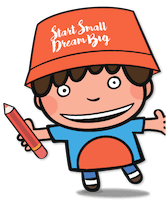Our K1 children at 217 Compassvale Drive embarked on an environmental project titled ‘Planet Pals: Saving the day, the GREEN way!’, where we aimed to inculcate environmental habits and initiatives through ‘Reduce, Reuse, Recycle’. The children were inquiring into how to minimize the usage of plastics and generating less waste in their daily experiences.
To promote sustainability and environmental consciousness within the school and broader community, the children were given the opportunity to design posters and distribute it to the residents of the neighbourhood.
Through this experience, the children developed a deeper understanding of their role in protecting the environment and their small daily contributions as environmentally conscious citizens in building a more sustainable future together.
As the children were inquiring into things that can be recycled and cannot be recycled, the parents were welcomed to contribute recyclable items from homd such as plastic bottles, jars, food containers, milk powder tins, buttons, wine corks, bread tags, bottle caps, shoe boxes and soda can pull tags for the children to explore during various learning experiences. The children were encouraged to sort the items according to the respective categories: plastic, glass, metal and paper.
The children learned also about saving the environment through recycling by watching a video of making recycled paper. They were given the opportunity to create their own paper in smaller groups. They tore, soaked, and dried the paper, and later discussed how they can use the recycled paper. This learning experience enhanced their fine motor skills, teamwork, creativity, and environmental awareness.
As the children were inquiring into “How do we use the 3Rs to create new things?”, the children were instructed to bring an unwanted t-shirt to school for them to upcycle it into a reusable shopping bag. After creating their shopping bags, the children were encouraged to bring it along whenever they go for groceries shopping with their parents. This will help to reduce the usage of plastic bags.
Term 2 Learning Journey to Upackt. This learning journey aimed to promote zero-waste lifestyle and instil social responsibility in children through ‘Waste to Wonder Workshop – Eco Enzyme Making’ which they were given to opportunity to upcycle their fruit waste into a multi-purpose chemical free cleaning liquid.
The children brought the Eco Enzyme home for fermentation to take place for approximately 3 months before using it as household cleaning products.
The educator also shared more information about Eco Enzyme with the parents via LittleLives.
During the field trip, the children were also engaged in package free shopping. They brought their own food containers and bought their own snacks over at the counter. They enjoyed this learning experience!
To address the increasing resource needs for our project, we have established a collaboration with the Preschool Market to source additional recycled materials such as buttons, fabrics, carton boxes, and more.
Prior to this experience, the educator showcased the picture of ‘Carton Couture’ 2019 by Nancy Judd to the children and invited them to talk about the creation and the materials used by the artist. Following that, in smaller groups of 4, the children were invited to brainstorm ideas for a ‘Recycle Runway’ outfit with their group mates. Some of them decided to create a ‘Hat, using food container, different coloured crepe papers, ribbon and cotton pads, ‘Superhero cape’ using using different coloured and textured ribbons, and ‘rings’ using old news papers.
During learning space exploration, at Wonder and Discover Space, the children were challenged to create simple infographics about waste management. They were encouraged to get inspiration for their infographics from the available printed materials.
After 3 months of fermentation, the children used the Eco Enzyme that they made during Term 2 learning journey to Unpackt to clean the classroom table after lunch.
At the end of the project, the children gathered the remaining recyclable items in the classroom and placed in the respective recycling bin.
In conclusion, our sustainability project has been a rewarding journey that not only educated the children about the importance of protecting our environment but also fostered a sense of responsibility and creativity. Through hands-on activities and interactive lessons, the children learned valuable experiences about recycling, conserving resources, and caring for the planet. This project has planted the seeds for a lifelong commitment to sustainability, empowering the next generation to make positive environmental choices as they grow. We are confident that the lessons learned will have a lasting impact, both in their lives and within the broader community!








































































